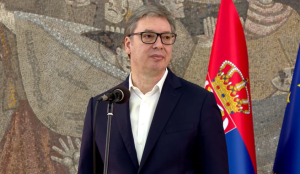Journalists’ and media associations and trade unions demand that the Ministry of Information and Telecommunications immediately halt the ongoing process of amending the Law on Public Information and Media, the Law on Electronic Media, as well as the drafting of a new Media Strategy, until conditions are ensured for transparent, inclusive and expert work.
Of the eight invited journalists’ and media associations and trade unions, only two – the Journalists’ Association of Serbia (JAS) and the Independent Journalists’ Association of Serbia (IJAS) – can be considered credible, and IJAS officially refused to participate in these working groups on 27 November for the reasons listed below.
In the current political, institutional and professional environment, there is no guarantee that the proposed changes would lead to an improvement in media freedom, journalists’ safety and alignment with European standards.
First of all, the composition of the proposed working groups seriously calls into question the credibility of the process, as the Ministry has included numerous GONGO organisations – entities without professional journalistic capacity that have for years supported pro-government and propaganda media. In addition, these same organisations have for years dominated the commissions for project co-financing, which allocate public funds to tabloids and pro-government media that systematically violate the Code of Journalists of Serbia.
At the same time, the most important and most expert journalists’ and media associations – with many years of experience in reforms and alignment of regulations with European standards are not included in the work.
Journalists’ and media associations and trade unions also recall that earlier processes of drafting media strategies and amending laws were already marked by failure and abandonment, including the collapse of the first working group for the Media Strategy in 2017–2018, as well as years-long delays in reforms in the period 2021–2023, precisely because of the excessive involvement of organisations without competencies and the absence of genuine dialogue. The same practice is now being repeated.
It is particularly worrying that some of the associations and individuals invited to the working groups are active participants in smear campaigns against professional journalists, thereby contributing to an atmosphere of pressure and violence. The number of attacks, threats and pressures on journalists is constantly increasing; relevant databases (Mapping Media Freedom, Council of Europe) show that Serbia today has the highest number of attacks on journalists in Europe. In such an environment, claims about “strengthening freedom of expression” have no real foundation.
The Ministry has not carried out an evaluation of the implementation of the current Media Strategy and its Action Plan, and without an analysis of previous results it is impossible to plan a new strategic document. Work on a new strategy without prior evaluation represents merely a formal fulfilment of obligations, without a substantive goal or any realistic expectation of progress.
Journalists’ and media associations and trade unions also draw attention to worrying public statements by the Ministry’s leadership, which show a lack of understanding of the role of the media in a democratic society, as well as a failure to recognise the importance of independent institutions, especially the Regulatory Authority for Electronic Media (REM).
Finally, in its invitation the Ministry refers to the Reform Programme and the European Media Freedom Act (EMFA), although EMFA is not envisaged at all in the Reform Agenda, and the obligations arising from it relate to consultations with the European Commission and alignment with the EU acquis – not to ad hoc processes such as those now initiated. The reference to EMFA appears to be an attempt to formally cover up procedural shortcomings.
Journalists’ and media associations and trade unions will not participate in processes that are only formally inclusive, yet substantively unprepared, non-transparent and politically instrumentalised.
We are ready to contribute to reforms once the following are ensured: a transparent and inclusive process, the participation of all relevant professional stakeholders, respect for international obligations, and a genuine commitment to improving freedom of expression and journalists’ safety.
Until then, we demand that the process of amending media laws be urgently stopped and that an open, professional and substantive dialogue on the future of the media system in Serbia be launched.
Coalition for Media Freedom: Media Association, Association of Online Media (AOM), Independent Journalists’ Association of Vojvodina (IJAV), Independent Journalists’ Association of Serbia (IJAS), Business Association of Local and Independent Media “Lokal Pres”, Slavko Ćuruvija Foundation and GS KUM Nezavisnost
Association of Independent Electronic Media (AIEM)
Belgrade, November 28, 2025.




